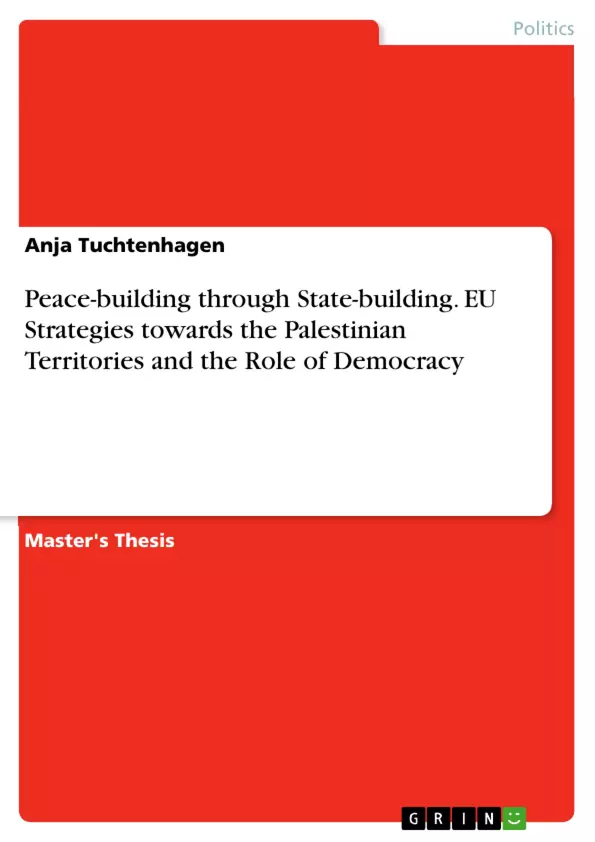This paper seeks to address the persistent problem of integrating democracy and good governance approaches as universal values into external policy-making. To this end, the EU´s state-building policies towards Palestine have been chosen as a case study. Palestine, presently not a sovereign state represents a case of international large-scale peace-building endeavor in a post Cold War context. The Palestinian case is insofar crucial for policy makers as it offers insights into democratization policies where there is no sovereign state to address. Instead, democratic structures and good governance have been established by the EU and the international community as a precondition for its very emergence.
The EU´s role among these actors as democracy promoter, state- and peace-builder is therefore interesting as the rationale of its very inception was the establishment of peace. It is a unique example of a Union of sovereign states being built on a territory whose inhabitants have been going to war with each other throughout history.
Drawing against this background the paper considers it valid to ask the question of what the EU does regarding the defence/ proliferation of its founding principles in its external relations, especially in an area of geographical proximity such as the Middle East which is troubled by the violent conflict between Arab states and Israel and particular between Palestinians and Israelis.
The explicit goal of this analysis is therefore to offer insight into how the EU embeds its external democratization agenda into the state- and peace-building approach applied in Palestine and on which notions these activities rest. Thereby it looks at the EU´s engagement starting in 2003 when democracy and good governance promotion in Palestine have gained popularity within the international donor community. Thereby the paper exclusively deals with Community policies and does not consider bilateral actions by its Member States. It seeks to shed light on the dynamics between the underlying theoretical concepts of the peace-building project in the Palestinian-Israeli conflict in order to find out if or up to which extent they are compatible with the EU´s commitment to external democratization. Therefore the main research question is:
“Is the democracy/ good governance support in Palestine by the EU an adequate means to promote peace in the Middle East?”
Inhaltsverzeichnis (Table of Contents)
- Introductory Part
- ABSTRACT
- Structure and Method
- Background of International Peace-building in Palestine
- The Oslo Peace Process
- The Post-Oslo Period
- Domestic Frictions
- The Conflict Today
- CONCEPTUAL FRAMEWORK
- The State
- The Concept of the State
- Peace
- Negative and Positive Peace
- Peace-building and State-building: Dependent on Each Other?
- Peace-building
- State-building
- Peace-building through State-building Paradigm
- Democracy and Peace: A Causal Relationship?
- Democracy
- Democratization
- Democratic Peace Paradigm
- Evaluation of Theoretical Framework
- Theoretical Part
- THE EU's CONCEPTION OF DEMOCRACY PROMOTION
- Democratization and Democracy in primary EU sources
- Classification
- PALESTINE AND THE EU
- Characterizing the OPT
- Theoretical Foundations of EU Democracy Promotion in the OPT
- Overview: EU Partnership with Palestine
- Instruments
- Quartet
- Supranational Policies
- Intergovernmental Policies
- Problematic Areas
- Focus: Security Sector
- Focus: Palestinian Domestic Split
- The Occupation and EU-Israeli relations
- Concluding Part
- RESUMEE
Zielsetzung und Themenschwerpunkte (Objectives and Key Themes)
This paper examines the EU's role in promoting democracy and peace-building in the Palestinian Territories. It analyzes the EU's strategies and approaches to state-building and democratization in the context of the Israeli-Palestinian conflict.
- The EU's conception of democracy promotion
- The EU's partnership with Palestine
- The role of democracy in peace-building
- The challenges of state-building in the Palestinian Territories
- The impact of the Israeli occupation on the EU's efforts
Zusammenfassung der Kapitel (Chapter Summaries)
The introductory part provides an overview of the research topic and its methodology. It explores the historical context of the Israeli-Palestinian conflict and the role of the Oslo Peace Process in shaping the current situation. The theoretical part delves into the concepts of state, peace, peace-building, and democracy, examining their interrelationships and exploring the different paradigms of peace-building and democratization. The empirical part focuses on the EU's conception of democracy promotion and its strategies in the Palestinian Territories. It analyzes the EU's instruments, partnerships, and challenges in promoting democracy and state-building in the context of the conflict.
Schlüsselwörter (Keywords)
The main keywords and focus topics of the text include democracy promotion, peace-building, state-building, the EU, Palestine, the Occupied Palestinian Territories, the Oslo Peace Process, the Israeli-Palestinian conflict, the Quartet, and EU-Israeli relations. The paper also examines the theoretical frameworks of the democratic peace paradigm and the peace-building through state-building paradigm.
Frequently Asked Questions
What is the main research question regarding the EU and Palestine?
The research question asks whether the EU's support for democracy and good governance in Palestine is an adequate means to promote peace in the Middle East.
How does the EU link state-building and peace-building?
The EU applies a "peace-building through state-building" paradigm, where establishing democratic structures is seen as a precondition for a sovereign Palestinian state.
What are the main challenges for EU democratization policies in Palestine?
Key challenges include the lack of a sovereign state, domestic frictions (Palestinian split), the security sector, and the ongoing Israeli occupation.
What is the significance of the Oslo Peace Process in this study?
The study provides background on the Oslo process and the post-Oslo period to explain the current dynamics of international peace-building efforts.
What role does "Good Governance" play in EU external policy?
Good governance is treated as a universal value that the EU attempts to integrate into its external relations to ensure stable and peaceful development.
- Citation du texte
- Anja Tuchtenhagen (Auteur), 2013, Peace-building through State-building. EU Strategies towards the Palestinian Territories and the Role of Democracy, Munich, GRIN Verlag, https://www.grin.com/document/337955



